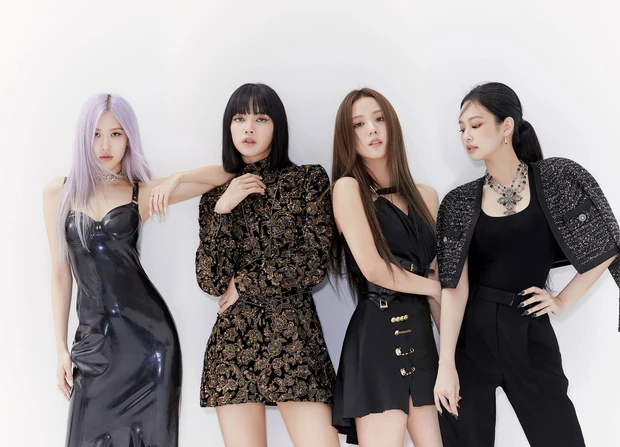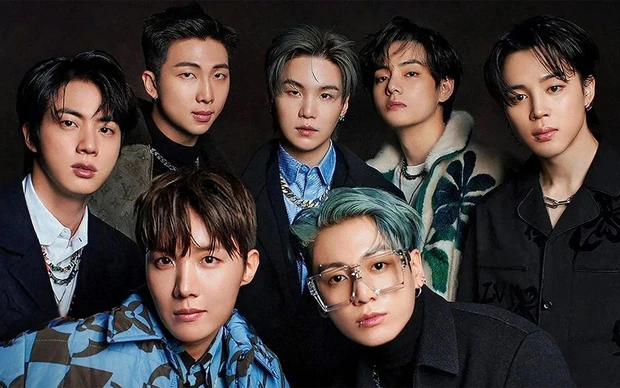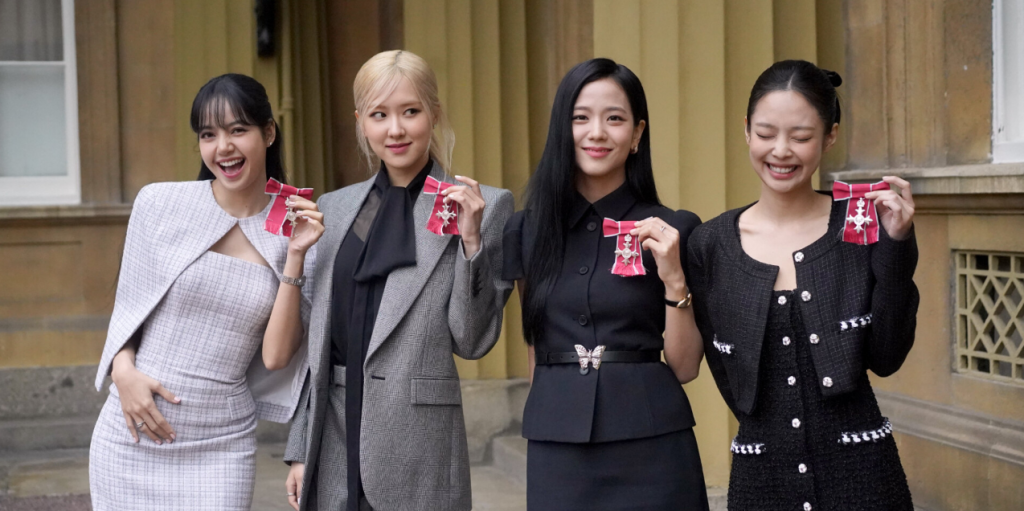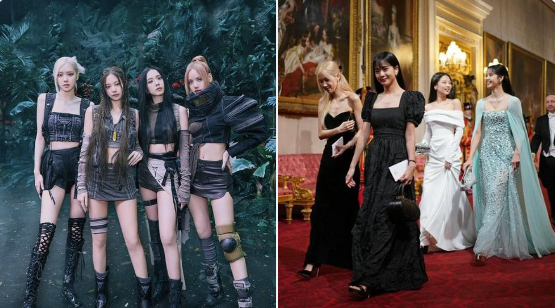British media site The Daily Mail delved into the various pressures behind “the world’s biggest girl band” BLACKPINK
The world’s biggest girl band
On November 22, BLACKPINK was seen in an elegant and sophisticated appearance as they met King Charles III in the largest room of Buckingham Palace – a place that once hosted Russian Tsar Nicholas I and many other heads of state.
For most people in their twenties, being awarded the honor of Member of the Order of the British Empire (MBE) by the British monarch would be the highlight of their lives.

However, for Lisa, Rosé, Jisoo, and Jennie, this latest honor is just a small footnote in their career filled with endless and unprecedented records, which range from countless chart-topping hits worldwide, sold-out concert tours, recognition at major music awards, to collaborations with international superstars like Selena Gomez and Lady Gaga.
They dominate the world of Kpop, standing atop a £50 million (63 million USD) empire, which is not limited to music but rather encompasses fashion, beauty, and entertainment. In fact, British media site The Daily Mail even named BLACKPINK as “the world’s biggest girl band” for their various achievements.
BLACKPINK’s global fame is truly enviable, evident in their Instagram with 57 million followers, three times that of Madonna, not to mention the impressive individual follower counts of each member.
Contrary to the modest poses at Buckingham Palace, on stage, they exude confidence and appeared as true queens.
This alluring appearance is a carefully selected image created on the K-pop idol production line, where each group appears before the public with perfectly choreographed dances, music videos resembling big-budget blockbuster films with flawless production, and not a wrinkle or strand of hair out of place on their porcelain-like white skin, said The Daily Mail
The K-pop Training Camp
Those interested in Kpop are aware that before debuting as members of a music group, idols must go through a trainee process at entertainment companies. Some quickly debut after a few years, while others may take a decade or more. However, not everyone is fortunate; most trainees are unable to withstand the intense competition and end up dreaming of being on stage forever.
This training period is where the “dark side” of Kpop is most evident, said The Daily Mail. Bullying, exploitation, and exploitation are believed to be common as young individuals endure rigorous training regimes, daily weight checks, and the pressure to undergo cosmetic surgery. Signing a contract means their every action is controlled.

Euodias, a 25-year-old YouTube star from Sunderland, England, who has Korean heritage, dreamed of becoming an idol and experienced life in a Kpop “training camp” firsthand.
She described life in the company-owned building as akin to some kind of scientific experiment.
“On a typical day we’d wake at 5am to get in some extra dance practice before school started at 8am. When the school day ended, we’d return to the company to be trained in singing and dancing. Trainees would practice until 11pm or later”, Euodias shared.
According to the former Kpop trainee, aside from attending classes, trainees were not allowed to go outside without permission from the management. Even if they requested, visits from friends or family were often denied. Dating was banned, and unplanned outings were also prohibited.
Euodias also added that while some trainees are allowed to sleep in the dormitory, those assessed as less likely to succeed, had to sleep on mats on the floor.
Despite the hardships, few complained because they all had ambitions, according to Euodias. The company always preached that everything the trainees went through was part of the necessary learning process to become a Kpop idol.
Instead of using their real names, Euodias revealed that young trainees were assigned a number and a stage name suitable for the idol image chosen by the company.
The appearance of the girls was closely monitored, to the point of being weighed weekly.
“Weight was the constant obsession. Everyone was required to be no heavier than 47kg, regardless of their age or height. If above the designated weight, they would ration your food. Sometimes they’d take away entire meals and ‘overweight’ trainees would just be given water. Starving yourself was normalised. Some trainees were anorexic or bulimic, and many girls didn’t have periods”, the YouTuber recalled.

Even Euodias herself passed out twice during dance practice due to dehydration and starvation, and trainees often have to carry unconscious friends back to the dorm.
Unable to endure such a life, Euodias decided to return to England after two years struggling in Seoul, South Korea.
BLACKPINK went through four to six years in such a rigorous training regime, which is compared to “boarding school” by Jennie, who said, “’It was like 14 hours a day, just training. It was really harsh.”

Momo, a Japanese member of TWICE, publicly shared in 2020 that she had to abstain from eating completely, getting by with just ice cubes.
“I was told I had to lose 7kg no matter what. That was the only way to be on the show. So I didn’t eat anything until that date and went to the gym all the time”, she said, adding that the diet ended up leaving her vomiting, crying, and fearing that she would die of starvation.
The Obsession with Appearance
South Korea is known as one of the most appearance-obsessed countries in the world. That is why the plastic surgery industry is booming in this nation.
It is thus evident that young idols must appear in perfect appearance. Kpop idols may not know how to sing, but their image must always be dazzling and flawless. However, not everyone is born with heavenly beauty, and “going under the knife” is the easiest option to change one’s appearance.
Although no BLACKPINK member mentioned plastic surgery as something they have done, they have undergone significant changes compared to their childhood days, said The Daily Mail.
Charles S. Lee, a renowned plastic surgeon in the United States and South Korea, asserts that all BLACKPINK members have had minor cosmetic procedures to achieve their current beauty. He analyzed the faces of each idol in a video and used his 20 years of experience to support his claims.

Meanwhile, Kim Min-seok, a former trainer at YG Entertainment – the management company of BLACKPINK, stated that cosmetic surgery was encouraged in the company.
“The most important thing is appearance. If a girl has a bad face and a good body, the problem can be fixed with plastic surgery”, he stated.
In fact, some stars have admitted to undergoing surgery. Lee Joo-won (or JooE), former member of MOMOLAND, revealed that she had a nose job in 2018. The late beauty Sulli also mentioned eyelid surgery.
Some beauty standards highly praised in Korea include round and large eyes, a slender nose, captivating pink lips, and fair, bright-toned skin. This obsession unintentionally turns these female idols into assembly line products as they were forced to pursue the “standards”
The risks that come with fame
K-pop Auditions are very fierce, with a success rate of 1 in 700, and only 10% of trainees who passed auditions are selected to debut on the music stage.
Once chosen to debut, future idols must sign exclusive contracts with management companies, with contract periods that can last up to 10 years.
A 2017 report from the Korean Fair Trade Commission likened these agreements to “slave contracts” and called for entertainment companies to revise harsh penalty clauses in case of contract violations and distribute income more fairly.
Korean journalist Lee Hark-joon assesses the lives of idols as machines and Spartan warriors. “They rarely have the opportunity to develop a normal academic life or normal social relationships,” he said.
Beyond the glittering image of K-pop idols, however, the media often reports heartbreaking stories.

In 2019, The New York Times exposed the pain of becoming a K-pop idol after Sulli and Goo Hara’s suicides. Two years earlier, SHINee’s main singer, Jonghyun, took his own life in his private apartment. In 2023, ASTRO’s Moonbin also passed away at a young age. All of these idols were in their 20s, the most beautiful time of life.
Dr. Sarah Keith, a music and communication lecturer at Macquarie University, Sydney (Australia), disagrees with criticisms aimed at K-pop. After extensive research into the music industry, she believes that criticisms such as “exploitation” and “coercion” are specific and do not reflect the overall picture.
According to Dr. Keith, people focus only on the dark side, overlooking the creative and positive aspects of K-pop. Describing K-pop as “a high-risk, high-reward system”, she believes it is a reasonable result of societal and industrial contexts.
Meanwhile, Dr. Haekyung Um, a senior music lecturer at the University of Liverpool (UK), notes that entertainment companies invest a lot of time and money in creating future stars and so cannot be blamed for profiting from their artists. It’s a give-and-take relationship, she assessed.
The lecturer also added that not only K-pop idols but also ballet dancers or piano artists must undergo rigorous training and competition in their high-demand professions. The path to fame is not easy, but once they reach the throne, they hold everything: money, fame, and respect that not everyone can have. That explains why K-pop idols are becoming a career choice for many young people, not only in Korea but globally.
Meeting with King Charles at Buckingham Palace is the latest milestone in BLACKPINK’s career. The head of the British royal family expressed admiration for the YG girls for striving to become global superstars while leaving a mark in charitable activities, including environmental protection against climate change and support for those in need.
Dr. Um points out the pressure from being at the top, although not easy, helps BLACKPINK adjust their behavior to be both excellent artists and good people. They must stay away from misconduct and contribute positively to society to maintain their fame.

Source: K14, The Daily Mail, The New York Times, Kbizoom

Leave a Reply